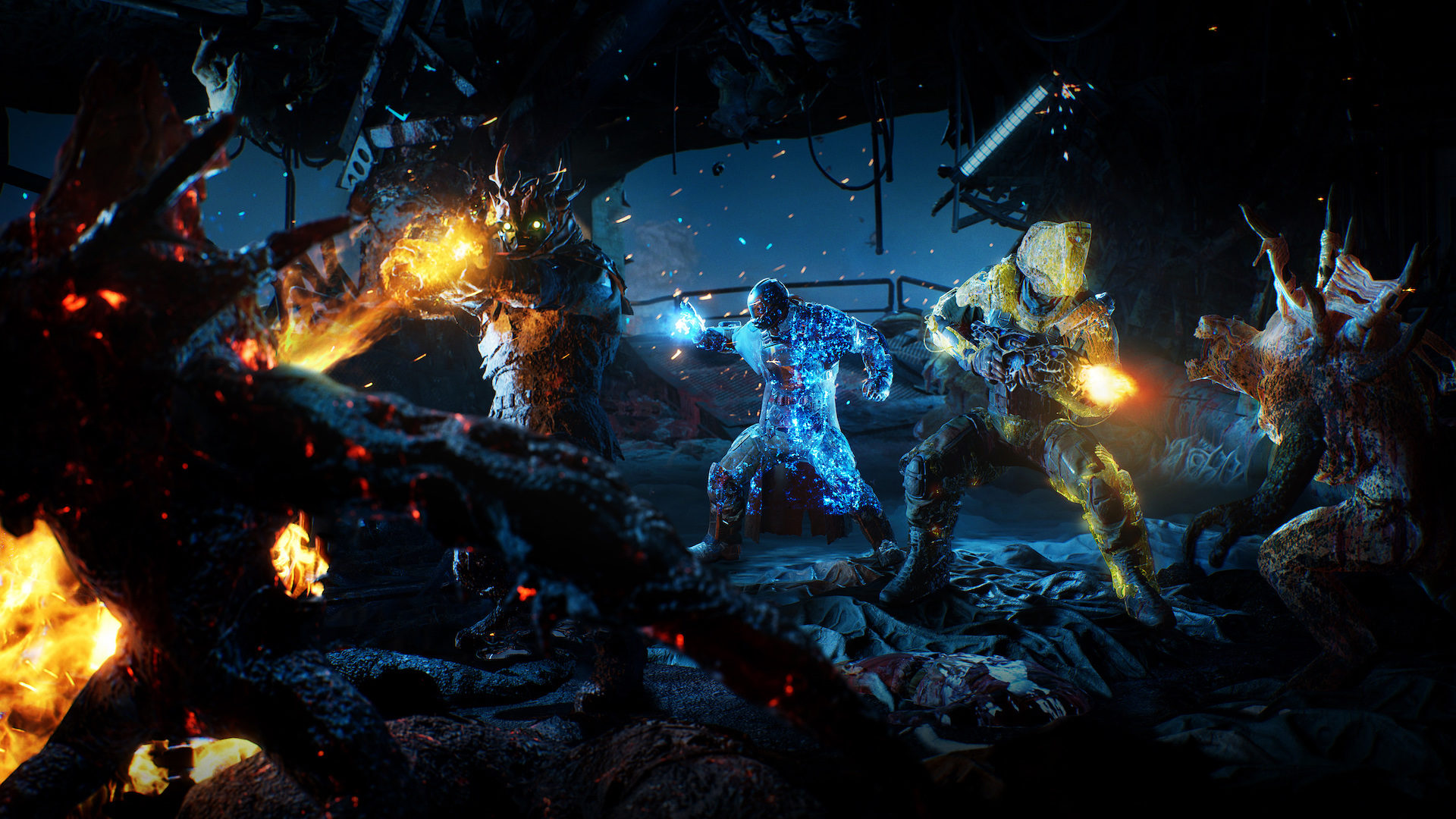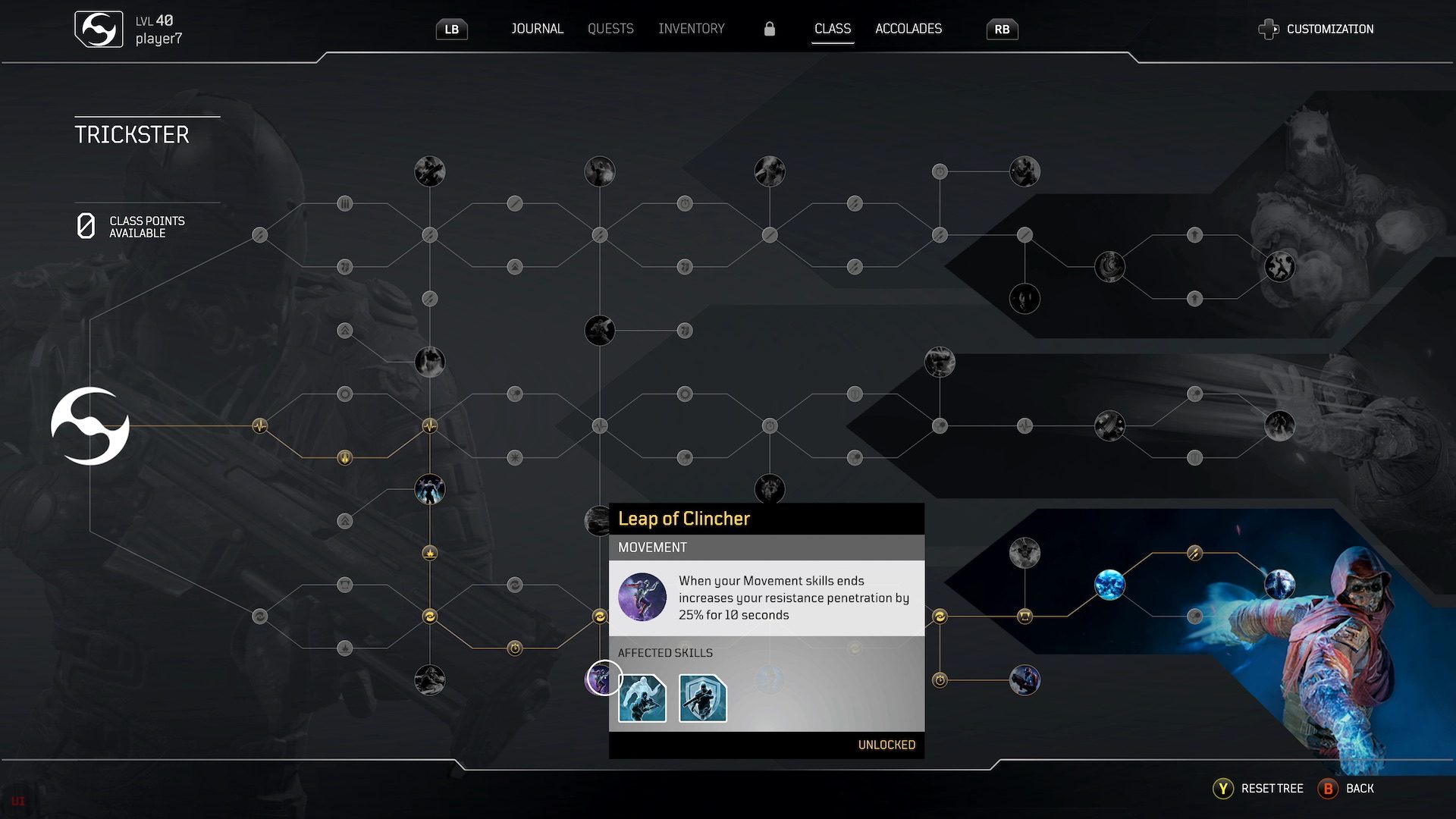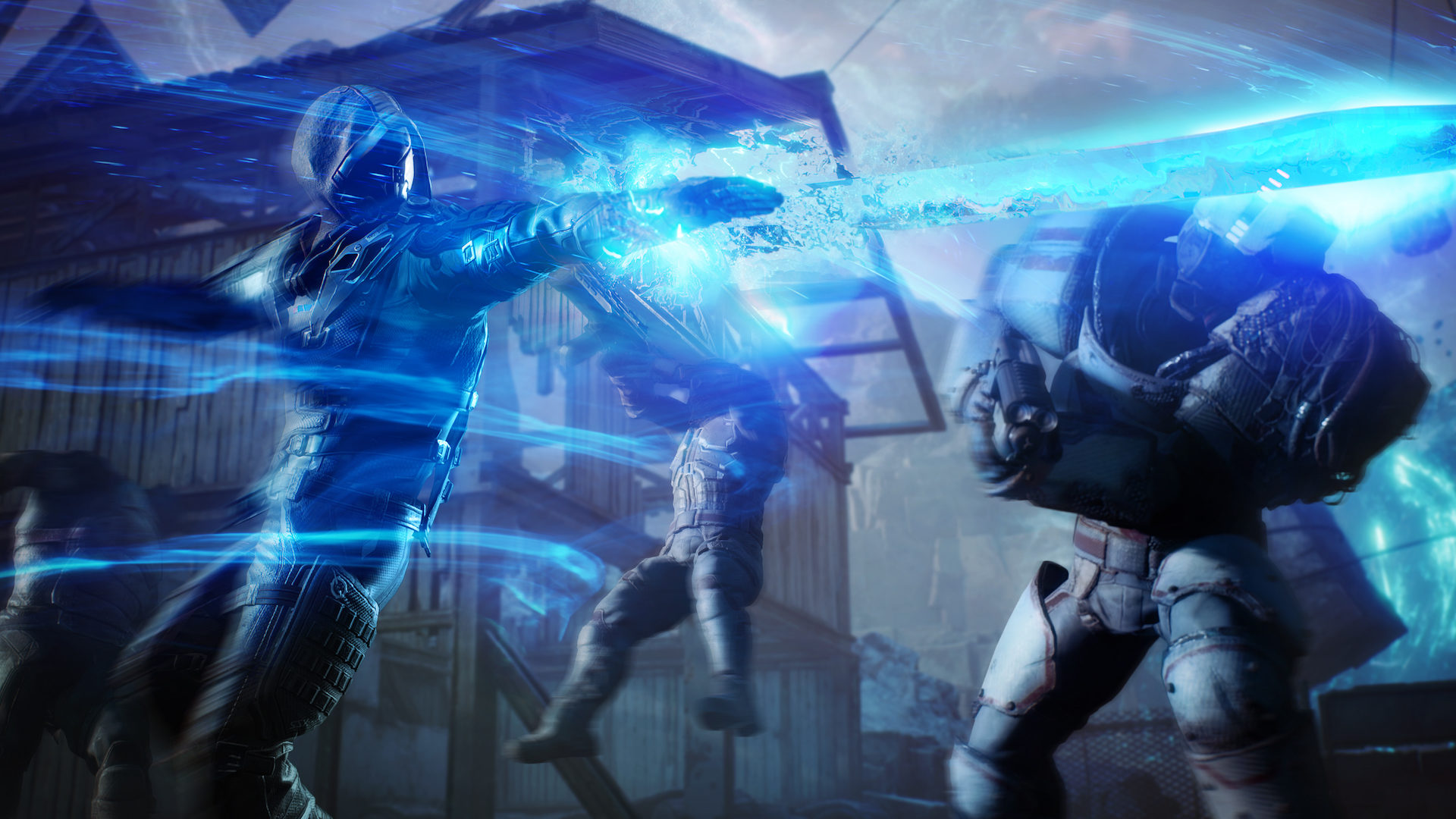When I arrived at the event venue to preview Outriders, I wasn’t expecting to go hands-on with what will be one of the first next-gen games.
As People Can Fly’s first effort since the studio literally bought its own freedom, Outriders was supposed to launch this summer as a last hurrah for current-gen gaming. Instead, one of the first talking points at the preview event was that Outriders will be launching this holiday on next-gen consoles, current-gen consoles, and PC, selling it as a true “next-gen experience.”
The phrase “next-gen” has lost some of its weightiness as mid-gen, upgraded consoles have shifted how we think about console generations. As consoles start to more overtly resemble gaming PCs (even though they’ve always been gaming PCs), and as hardware makers begin to favor modular improvement over schism-causing leaps forward, “next-gen” becomes less about the awe and wonder of experiencing a taste of the future and more just bald-faced marketing.
Outriders launching on Xbox Series X and PlayStation 5—along with PC, Xbox One, and PlayStation 4—technically makes it the first next-gen game I’ve played. But what does that even mean anymore?
When I asked People Can Fly studio head Sebastian Wojciechowski what they meant when they said Outriders was a “next-gen experience,” he couldn’t tell me much. In fact, he could barely tell me anything. “We are not going to talk about next-gen right now,” he said, in regards to how they were going to support the game.

I wasn’t looking for technical details or scoops on the hardware, but I wanted to know what they meant when they said “next-gen experience,” because that doesn’t just mean pretty graphics and a higher framerate. Philosophically, next-gen should mean something.
“The only thing we can say,” Wojciechowski said, “is more that we believe, going into this possibility to launch as a next-gen game that it’s always better to launch a new IP to next-gen, so let’s summarize it this way.”
So was that it? A “next-gen experience” is more about the timing of release and the positioning of a potential franchise than it was about pushing the boundaries? It was a little disappointing, considering what I’d historically consider next-gen experiences: Super Mario 64, Grand Theft Auto III, Halo: Combat Evolved—games that fundamentally changed the way we thought about what console games could and couldn’t be.
Playing Outriders didn’t necessarily feel like a “next-gen” experience—probably because we weren’t actually playing on a next-gen console but rather a hulking, expensive, “top-of-the-line” gaming PC rig. That’s not to say it didn’t look amazing, because it did, but that’s to be expected when the hardware is the best money can buy.
The story itself also didn’t feel all that “next-gen.” Stop me if you’ve heard this one before: The Outriders are a group of space colonists who are looking to settle on a habitable planet after Earth has experienced one too many natural disasters and wars. However, when they arrive on a planet called Enoch after 80 years in cryo sleep, they’re met with some kind of electrical storm called the “Anomaly” that rips people apart on a molecular level. While most Outriders who encounter this Anomaly disintegrate into Infinity War–style space dust, a handful survive and become Altered, suffused with abilities they received from the Anomaly. When your particular Outrider survives the Anomaly, they’re put back into cryo sleep for another 30 years, and when they wake back up, Enoch has devolved into a Mad Max world where different tribes wage wars over the barest of essentials. You’ve got to respect a game that somehow figures out a way to shoehorn not one but two separate instances of cryo sleep into the prologue.
The genre also felt particularly current-gen. I guess it’s important to state what Outriders actually is: It’s a third-person, co-op, RPG shooter that has all the stuff you’d expect from that genre, with loot drops, classes with different special abilities that recharge over time, skill trees to level up, and so on.
Outriders is already one of the best versions of that formula I’ve played. I’ve made it known before that the “looter shooter” subgenre isn’t exactly my favorite: It’s too recursive, too grindy, and way too heavily favors the “looter” over the “shooter.” What makes the difference is People Can Fly’s pedigree. As Wojciechowski put it, the shooter genre is “in [People Can Fly’s] DNA,” with titles like Painkiller, Bulletstorm, and Gears of War: Judgement in its catalog. Outriders’ gunplay feels great, the movement is notably fluid for a third-person game, and the different enemy types are fun to battle.
What’s also refreshing is how Outriders is placing a premium on its main quest. According to the developer, completing the main quest will take around 40 hours, and that doesn’t include all the tangential side quests that you’ll encounter. And while the setup for the story might be cliché, the more granular story beats and the backdrop of a futuristic civil war on an alien planet could provide for some entertaining, campy narrative beats. It’s still too early to tell, but what I’ve seen so far is promising as long as it doesn’t end up taking itself too seriously.
Unlike a lot of its competition, Outriders is also not a “games as service” title, though there are plans for possible old-school expansions to the base game, according to Wojciechowski. In some ways (mostly good), it could almost be considered a last-gen type of experience.

Where Outriders feels most next-gen is in its core gameplay. Outriders feels like a mash-up of not only different genres, but very specific video games—it’s part Gears of War, part Destiny, part Doom 2016. It’s like if Remnant: From the Ashes had a more experienced team and a Square Enix–sized budget.
What makes Outriders particularly satisfying is how its class-based RPG mechanics complement its cooperative gameplay. You start the game as a generic Outrider with no special abilities, but at the end of the thankfully brief prologue tutorial, you’ll have the chance to pick from one of four Altered classes to play: the close-quarters Trickster, the mid-range Pyromancer, the tanky Devastator, and a fourth class that People Can Fly hasn’t revealed but which I’m guessing is a long-range specialist. Each of these classes comes with interesting and diverse abilities that, when combined with other classes’ abilities, lend a sense of strategy where most RPG shooters favor individual acts of heroism.
My favorite class, the Trickster, is themed around the manipulation of time. The Trickster’s first ability lets you slice what is essentially a time sword in a circle, slowing down and damaging whatever enemies are nearby. Taking that to the next level, the Trickster also comes with an ability that lets them throw down a bubble shield that doesn’t deflect bullets but rather slows them down, along with any enemies within the bubble. Combine this with the Devastator’s ability to Hulk-smash the ground in a powerful area of effect attack, and a little teamwork can very quickly eliminate large groups of enemies.
Besides the abilities, there’s another major consideration when picking your class: how your character can heal themselves. Outriders doesn’t give players health pick-ups or regenerating health. There aren’t even abilities that specifically heal players and their allies. Instead, each class has a specific way to gain back health. The Pyromancer gets health back when enemies that they’ve marked with their fire-based abilities are killed. The Devastator, meanwhile, gets health back when performing close-quarter kills, and the Trickster only has to be close to enemies that are killed, by themselves or teammates. This means that, as with 2016’s Doom or Control, it pays to get into the action and stay active in the fight, encouraging each class to play to their strengths.

But there was one aspect to the gameplay that felt a little tacked on, and that was the cover mechanics. As in Gears of War, you can take cover with a button press, but the mechanic feels slightly at odds with the rest of the gameplay design. Cover works in Gears because the rest of the gameplay is paced around it with slow, methodical movement. Outriders, meanwhile, is fast-paced and in your face—at least for the two classes I played. Cover can be a good way to take a breather, but eventually you need to get out of cover and close the distance. Using different buttons to take cover and to mantle objects also seems like a waste of controller space.
Another area where Outriders seemed notably current-gen is in its RPG mechanics. Wojciechowski said that People Can Fly wanted to “disrupt the genre” of shooters when conceptualizing the game, though recognized that there are games similar to what Outriders is trying to achieve. Still, an RPG-shooter that actually leaned into the often-forgotten side of RPGs—i.e., the role-playing—would have definitely set the game apart from its competitors, which largely set players on a predetermined narrative path. Unfortunately, Outriders doesn’t offer much in terms of narrative choices, yet it lets players go on side-quests, both during main quests and when hanging out in the game world’s hub center. And hey, at least the player character actually talks, unlike The Division’s stoically murderous agents and Destiny’s piously silent Guardians. They’re even in all the main story cutscenes, unlike Borderlands 3’s Vault Hunters. Still, an RPG shooter with a branching storyline sounds like it could have been kind of next-gen, though that isn’t the game that People Can Fly is making.
If there’s one thing that really stood out about Outriders besides the awesome, Gears-style, gib-worthy shotguns, it’s the timing for its release. Do we need another RPG shooter that doesn’t really push the genre in a new direction? Not really. Does Outriders truly, honestly feel like the passion project of a newly independent studio? That’s hard to say at the moment. But do we want to have at least one really fun game to play when the new consoles launch that actually take advantage of the hardware? Definitely.
Outriders is not so much a next-gen experience as it is a culmination of everything that’s happened to the genre this gen. It’s iterative, it’s zeitgeisty, but hopefully it’s not the only thing that the future has in store.
Images: Square Enix

Michael Goroff has written and edited for EGM since 2017. You can follow him on Twitter @gogogoroff.